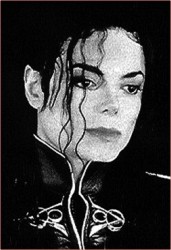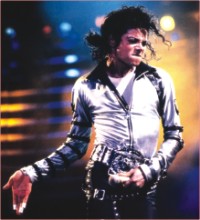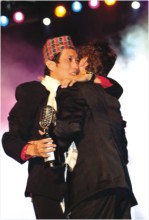Music
Michael Jackson (part II)
Shamma M. Raghib
(Continued from last week)
 Jackson's eternal childhood image however did not prevail in the songs that he sang. In 1982, "Thriller", Michael's second album with Quincy Jones, was released, and went on to become one of the most commercially successful albums of all time. The accompanying video in the song “Beat It” was equally spectacular, portraying Jackson as a master of dance. The "Thriller" album and singles won Jackson a further seven Grammies and amidst this run of hits, Jackson slotted in 'Say Say Say', a second chart-topping duet with Paul McCartney. Jackson's eternal childhood image however did not prevail in the songs that he sang. In 1982, "Thriller", Michael's second album with Quincy Jones, was released, and went on to become one of the most commercially successful albums of all time. The accompanying video in the song “Beat It” was equally spectacular, portraying Jackson as a master of dance. The "Thriller" album and singles won Jackson a further seven Grammies and amidst this run of hits, Jackson slotted in 'Say Say Say', a second chart-topping duet with Paul McCartney.
He accepted the largest individual sponsorship deal in history from Pepsi-Cola in 1983; the following year, his involvement in the Jacksons' 'Victory Tour' sparked the greatest demand for concert tickets in the history of popular music. Michael Jackson had by now become an almost mythical figure, and like most myths he attracted hyperbole. A group of Jehovah's Witnesses announced that he was the Messiah; he was said to be taking drugs to change his skin color to white; it was claimed that he had undergone extensive plastic surgery to alter his appearance; and photographs were published that suggested he slept in a special chamber to prevent himself ageing.
Michael's next albums were deemed disappointing after the phenomenal success of Thriller. The long-awaited "Dangerous" arrived at the end of 1991 and justifiably scaled the charts. This was a gutsy techno pop album, with Teddy Riley contributing to a number of tracks. The lead-off single "Black Or White" became a huge transatlantic number 1, topping the U.S. charts for seven weeks.
Until 1992, his refusal to undergo probing interviews had allowed the media to portray him as a fantasy figure, a hypochondriac who lived a twilight existence cut off from the rest of humanity. He attempted to dispel this image, and succeeded to a degree, with a carefully rehearsed interview with U.S. talk show host Oprah Winfrey in 1992. The televised program was shown all over world, during which viewers saw his personal funfair in the back garden, and watched as Jackson spoke of his domineering father.
 However, the unthinkable happened in 1993, just as Jackson's clean image was at its peak. Allegations of sexual abuse were made by one of Jackson's young friends and the media had a field day. Jackson's home was raided by police while he was on, clearly disturbed, Jackson cancelled a number of performances due to dehydration. No charges were laid, and things began to calm down until November 1993, when Jackson left the USA and went into hiding. Additionally, he confessed to being addicted to painkillers and was seeking treatment. After this admission, Jackson's long-time sponsors Pepsi-Cola decided to pull out of their contract with the now damaged career of the world's most popular superstar. The media were handed more fodder when he married Lisa Marie Presley on May 26th, 1994, perhaps in an attempt to rebuild his image. However, the unthinkable happened in 1993, just as Jackson's clean image was at its peak. Allegations of sexual abuse were made by one of Jackson's young friends and the media had a field day. Jackson's home was raided by police while he was on, clearly disturbed, Jackson cancelled a number of performances due to dehydration. No charges were laid, and things began to calm down until November 1993, when Jackson left the USA and went into hiding. Additionally, he confessed to being addicted to painkillers and was seeking treatment. After this admission, Jackson's long-time sponsors Pepsi-Cola decided to pull out of their contract with the now damaged career of the world's most popular superstar. The media were handed more fodder when he married Lisa Marie Presley on May 26th, 1994, perhaps in an attempt to rebuild his image.
The marriage collapsed nineteen months later, giving further rise to allegations that it was merely a set-up.
Michael did, however, enhance his reputation with a new album called "HIStory - Past, Present and Future, Book 1". One half of the double set chronicled his past hits, but there was the equivalent of a new album forming the second half. Lyrically, the new material was strong, and Jackson very cleverly gave himself a forum to respond to his critics. Although not breaking any new ground musically, the sound was refreshingly varied and, as ever, highly polished. The downside of this return was a sickening display of self-aggrandizement at the 1996 BRIT AWARDS. Controversy surrounded Jarvis Cocker (of Pulp), who invaded the stage in protest while Jackson, dressed in Messiah-white, was surrounded by, among others, worshipping children and a rabbi.
Another marriage was in the cards for Michael Jackson. In November 1996, he announced that his friend Deborah Rowe (an assistant to his dermatologist) was carrying his child. Three months later, Rowe gave birth to Prince Michael Jackson, Jr. A second child, daughter Paris Michael Katherine was born in the spring of 1998. Michael and Debbie divorced in October 1999, but the couple mutually agreed remain friends.
Michael was inducted into the Rock and Roll Hall Of Fame on March 19, 2001, along with Aerosmith, Solomon Burke, The Flamingos, Queen, Paul Simon, Steely Dan, and Ritchie Valens.
In November, 2002, Michael again caused a media stir when he appeared with his third child, Prince Michael II, in Berlin, precariously holding the infant out of a third floor window, and draping a towel over the baby's head. It seems that The King Of Pop just can't stay out of the tabloids.
On November 19th, police investigators conducted a criminal probe at Michael's Neverland Ranch. Court TV reporters, who broke the story, cited sources as saying the probe involved a new allegation against Jackson of sexual abuse involving a 12-year-old boy. In a statement, Jackson said he did not know why his Neverland Ranch was the target of a criminal investigation. Jackson's lawyers said that Michael will co-operate fully with any probe. They also pointed out that he has been involved in over 1000 lawsuits. Jackson and his three young children were not at the ranch at the time of the search, but were in Las Vegas, where the pop star was filming a video. More than 20 investigators from the Santa Barbara County sheriff's and district attorney's offices served a warrant as part of an "ongoing criminal investigation", Sgt Chris Pappas said in a statement. The charges against Jackson fall under California Penal Code 288, which carry up to eight years in prison and a $10,000 fine.
Meanwhile, on February 1st, 2004, Michael's younger sister Janet touched off a furor during the nationally televised Super Bowl game, when she bared her chest during a half-time song and dance routine with pop star Justin Timberlake. At the end of a song titled "Rock Your Body", Jackson allowed Timberlake to rip away the leather cup covering her, as they sang: "Gonna have you naked by the end of this song"
CBS television, one of the most watched television programs of the year in the US, apologised for the incident. "CBS deeply regrets the incident that occurred during the Super Bowl halftime show," the network said after the CBS switchboard was flooded with angry phone calls. "We attended all rehearsals during the week, and there was no indication any such thing would happen. We would like to apologize to anyone who was offended," said CBS. Even though both performers said the flash of skin was unintentional, a January 28th story on MTV's Web site promised "shocking moments" during Jackson's performance. The National Football League issued a statement saying the show would likely be the last for the Super Bowl produced by MTV. " It's unlikely that MTV will produce another Super Bowl halftime," they said.
On June 13, 2005, Michael's child molestation trial finally came to a conclusion. He could have received nearly 20 years behind bars if convicted of charges that he molested a 13-year-old cancer survivor at Neverland in 2003. Although he got vindication from the jury, it is no guarantee that Jackson can overcome the worst press ever suffered by a celebrity.
So far, on November 15, 2006, Michael gave his first public performance since his acquittal when he sang a fleeting rendition of "We are the World" at the World Music Awards in London, which was honoring him with an award commemorating the 25th anniversary of his hugely popular album, "Thriller". It is no doubt that the King of Pop still remains a fad for growing teens and his songs continue to be everlasting. Only time will tell if he can reclaim his title of The King of Pop.
Indian Idol and Bangladeshi admirers
Dr Binoy Barman
 There was enormous buzzing around after the matter of Indian Idol was settled on 23 September, 2007. At the end of about seven-month long waiting, people as if burst into endless talks. They chattered and pattered on a par with the media hype as the excitement continued to hover in the air. Prashant Tamang was declared Indian Idol. A police constable from Darjeeling, Prashant demonstrated extraordinary feat of singing. He won the heart of millions and clinched the number one position in the grand gala aired on Sony Entertainment Television. He was awarded a Maruti car and a contract of one crore rupees. Despite having no institutional training in music, amid insolvency in family and education not beyond high school, he could make it to the top. He made the impossible possible. He overcame all limitations around him and reached the point of success he desired and deserved. There was enormous buzzing around after the matter of Indian Idol was settled on 23 September, 2007. At the end of about seven-month long waiting, people as if burst into endless talks. They chattered and pattered on a par with the media hype as the excitement continued to hover in the air. Prashant Tamang was declared Indian Idol. A police constable from Darjeeling, Prashant demonstrated extraordinary feat of singing. He won the heart of millions and clinched the number one position in the grand gala aired on Sony Entertainment Television. He was awarded a Maruti car and a contract of one crore rupees. Despite having no institutional training in music, amid insolvency in family and education not beyond high school, he could make it to the top. He made the impossible possible. He overcame all limitations around him and reached the point of success he desired and deserved.
The entertainment programme like 'Indian Idol' is tremendously popular among spectators not only in India but also in Bangladesh and elsewhere. It is favourite to the young and old - male and female alike. It is liked for several obvious reasons. First, it provides good amusement which may be enjoyed with the family. Secondly, it directly involves the audience who have a say in the matter. Thirdly, it gives the audience a taste of competition, not simply among the participants but also among themselves. Fourthly, it ensures the best position for the best person regardless of his/her personal and community identities. Fifthly and lastly, it is well organised with the involvement of expert personalities who can manage things up to the expectation of the audience.
Now, is there anything wrong with the people of Bangladesh getting into frenzy with Indian Idol, Sa-Re-Ga-Ma, Kasautti Zindagii Kay, or Kaun Banega Crorepati? They attract audience from all around the world in their own merit. They are enjoyable and full of brilliant ideas. People like them, not under any pressure or compulsion, but spontaneously, from the natural impulse of their heart. The expression of true feeling cannot be suppressed with the thought of narrow nationalism. In this age of globalisation any event transcends national and geographical boundary to knock at the door of anybody. If anything is good, it will be appreciated by people; and if it is bad it will be outright discarded by them. The cultures of the world will come close to each other in the way and be mutually benefited through constant interactions. There is nothing to be intimidated. Good things will survive and bad things will perish. That is beneficial for the total humanity, isn't that? Internationalism is the order of the day and we should accept the reality.
Alien cultural elements are pouring in our country through television, radio, internet and migration. It cannot be stopped. Notice, on the other side, wherever the residents of Bangladesh are going, they are carrying Bengali culture with them. Whenever programmes are being broadcast in Bangla, they are spreading to an international audience. When our cultural troupes are performing in foreign lands, they are disseminating our cultural richness there. What we should do in the changing world reality is to enrich ourselves culturally so that we get sharper competitive edge and ensure better place in the flux of currents. We must not confine ourselves inside cocoons; rather we shall open our windows to let air in from every nook and corner of the world, as others might also do so. Protectionism is not the right way. It is against the spirit of the day. It is true for economy as well as culture.
In recent past Bangladesh also produced some entertaining TV programmes which attracted a huge number of beholders. Recall Close-up 1. The programme created quite a stir among the viewers of the country, especially the young generation. With great interest they watched every episode and actively took part in the process of voting from time to time. It was a massive success as a programme, I can tell you. People still remember the triumphant faces of local origin when Indian Idol comes in the way now. People probably expect more such programmes, of superior quality. They want more talents to be searched out - talents who they can feel proud of. They want Bangladeshi Idol in front of their eyes to adore. Indian Idol is not anything to be shunned, but we can learn from it and pave our own way forward.
The writer is Assistant Professor, English, Bangladesh University. Email: binoy_barman@yahoo.com
|
